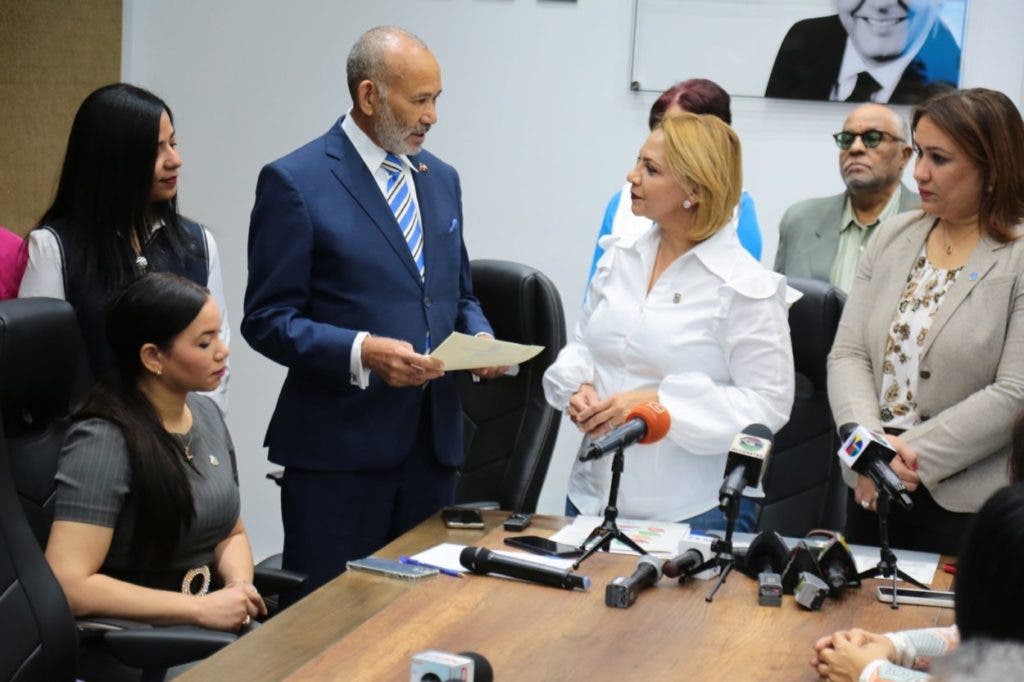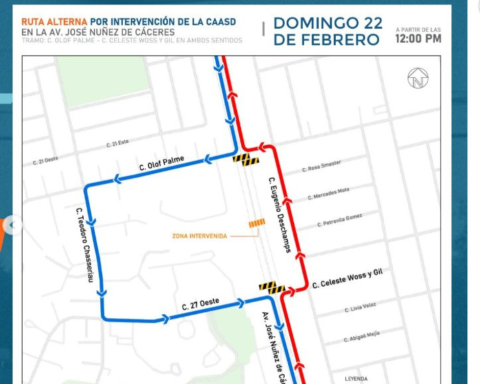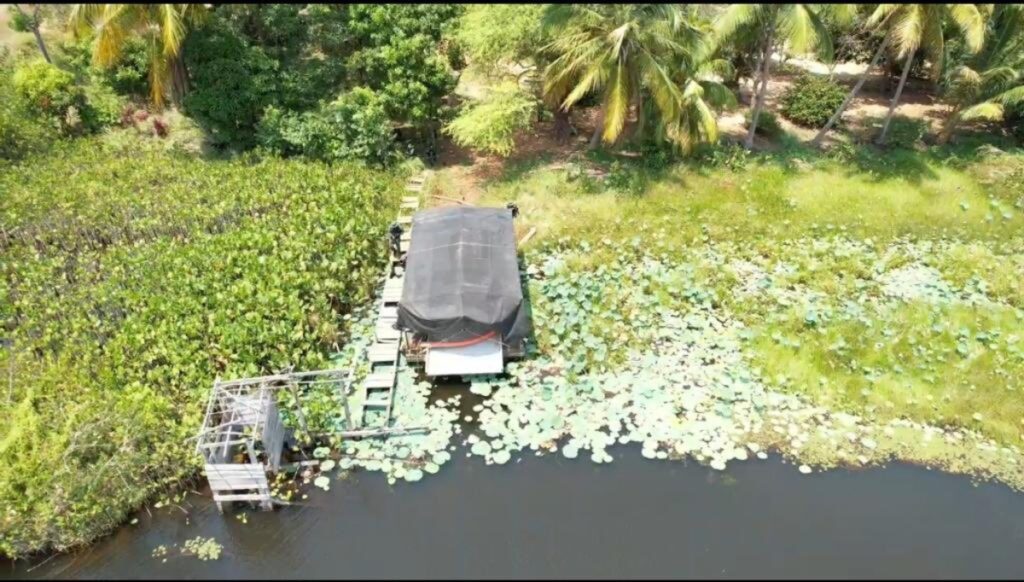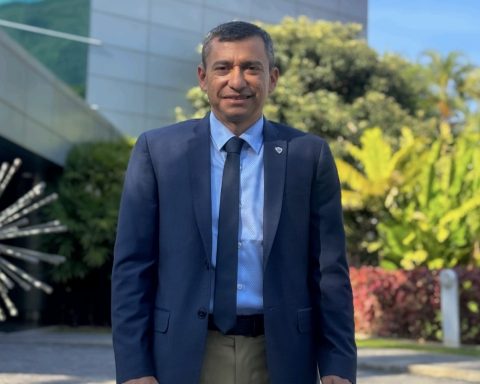Santo Domingo.- The executive director of the National Institute of Student Welfare (INABIE), Víctor Castro, delivered this Tuesday, accompanied by a delegation from the Food and Agriculture Organization of the United Nations (FAO), the preliminary draft of the Law on Food and School Nutrition to a commission of deputies belonging to the Parliamentary Front against Hunger headed by legislator Soraya Suárez to be submitted to the National Congress.
When delivering the legislative proposal, Castro highlighted among the bets of this bill is that the cooking of food aimed at the student population of the public sector is carried out in kitchens within schools in a progressive manner.
“We know that there is a clamor for food to be cooked in educational centers, so we understand that in a project of this nature this aspect should not be left aside. That the suppliers can prepare the food rations from the same campus in accordance with the menus established by the Inabie team of specialists”, explained Castro.
You may also like: Inabie executes actions to counteract the rate of obesity in students
In the event that the conditions of the educational center do not allow a kitchen facility, the piece establishes that they be prepared in establishments that are not more than a thousand meters away from it, all this in order to prevent any risk of contamination and foodborne illnesses.
The bill also promotes the integration of family farming into the School Feeding Program and the integration of local producers.
With this, a State policy would be established to regulate the issue and thus be able to have a greater guarantee of what is served.
When speaking about the legislative initiative, deputy Soraya Suárez highlighted that this piece is possibly one of the most important to be introduced in this period because it will benefit the students who are the ones who will lead the country.
The commission that made the delivery included Mariella Ortega and Guadalupe Valdez in presentation of the FAO, as well as the consultant Dorina López, who participated in the preparation of the proposal.
Inabie was represented by Ana Carolina Báez, Director of Formulation and Nutritional Evaluation, and Director of Planning Gerard De Los Santos.
Other news
The bill that will be submitted by Deputy Suárez also seeks for the State to prioritize the necessary actions to guarantee the supply of free and permanent drinking water in schools.
It also prohibits the sale of junk or ultra-processed food in public and private centers and in their surroundings to promote healthy eating habits from the classroom.
The Food Law is the result of extensive participatory work by representatives of INABIE, FAO, the Parliamentary Front Against Hunger, the Center for Research and Social Promotion (CIPROS), among other entities, as well as consultations with more than twenty key actors in national territory, in the area of agriculture, health, education, nutrition, purchasing and contracting and leaders of civil society organizations, as well as Dominican and foreign laws on school feeding.
The draft delivered to the Chamber of Deputies consists of 105 articles and six chapters that seek to provide the Dominican Republic with a law that guarantees the rights of students in the public and private system in terms of food and nutrition.
The scope of application of the regulation only excludes private schools in relation to the provisions and requirements on the School Food Program that is delivered only in public centers authorized by the Ministry of Education.
School food and nutrition education
The piece contemplates that a food and nutrition education curriculum focused on competencies be established in educational centers, in a regular and progressive manner, that integrates aspects of hygiene and environmental considerations, through the joint action of education professionals, the school community and of the technical managers.
The food and nutrition education curriculum should aim for students and other actors in the school community such as principals, teachers, students, families and suppliers to acquire basic and context-appropriate competencies that allow them to navigate the food environment and improve their feeding.
It proposes the creation of school gardens in educational centers for pedagogical purposes.
Prohibition of cafeterias and ultra-processed foods
If this regulation is approved, cafeterias in schools will be prohibited by law, as well as the sale of food within 500 meters of educational centers.
While private schools that have cafeterias, booths or private vendors, must supervise the products that are consumed by students to guarantee the prohibition of the sale of ultra-processed products and sugary drinks within private schools.
Likewise, the promotion of food and beverages that are not healthy for children and adolescents in the school environment would be prohibited.
Guaranteed budget
For the application and execution of this project, the National Budget of the Nation must allocate sufficient resources to guarantee the acquisition of quality food in the implementation of the School Feeding program through the funds destined to the Ministry of Education.
“The budget for school feeding will always be progressive and will increase according to the coverage, it can never be reduced, nor can these resources be used for purposes other than those established in this law,” reads the document delivered to the Chamber of Deputies .
Inter-institutional coordination
The Ministry of Education through Inabie is the executing agency for food management. The co-responsible entities that have the functions of regulation, control, monitoring and support for the implementation process of the School Feeding Law are: the Ministries of Agriculture, of Public Health, the Dominican Institute for Quality (INDOCAL), the Municipal Councils and General Directorate of Public Procurement.
This last body is responsible for preparing special regulations for product purchases and accompanying the design of standards, specifications and guidelines for contracting school meals, defining the criteria and conditions to guarantee the participation of family and local agriculture. in the school feeding supply chains.
sanctions
The draft bill considers any action or omission by public servants and other responsible persons in the context of school feeding, which contravenes or infringes its content, to be an infraction.
The future law obliges the directors of educational centers to constitute and form commissions to supervise food and the proper use of the resources destined for school feeding.
Public servants who misuse the resources destined for school feeding will be dismissed and submitted to Justice.
It also specifies that suppliers can have their award revoked if they are awarded in a public procurement process, after having benefited from fraudulently obtained confidential information, also if they fail to comply with the obligation to deliver food, in terms of quality, safety, and/or quantity of food.
















